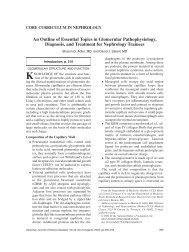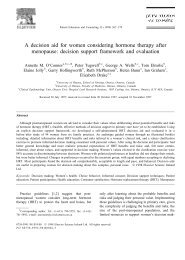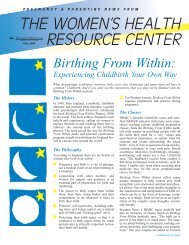Surgery and Healing in the Developing World - Dartmouth-Hitchcock
Surgery and Healing in the Developing World - Dartmouth-Hitchcock
Surgery and Healing in the Developing World - Dartmouth-Hitchcock
You also want an ePaper? Increase the reach of your titles
YUMPU automatically turns print PDFs into web optimized ePapers that Google loves.
43<br />
440 <strong>Surgery</strong> <strong>and</strong> <strong>Heal<strong>in</strong>g</strong> <strong>in</strong> <strong>the</strong> Develop<strong>in</strong>g <strong>World</strong><br />
results measurable <strong>in</strong> blood chemistries <strong>and</strong> goiter size. What happened to <strong>the</strong> <strong>in</strong>dividuals<br />
<strong>and</strong> <strong>the</strong> collective society of which <strong>the</strong>se treated <strong>in</strong>dividuals were a part? An<br />
<strong>in</strong>crease <strong>in</strong> metabolic rate was accompanied by an <strong>in</strong>crease <strong>in</strong> caloric dem<strong>and</strong> —I<br />
created hunger. Hypothyroidism is a low fertility state; a population explosion followed<br />
<strong>the</strong> vertical health care program accompanied by a midwifery program which<br />
toge<strong>the</strong>r with <strong>the</strong> iod<strong>in</strong>e repletion elim<strong>in</strong>ated cret<strong>in</strong>ism <strong>and</strong> decreased <strong>in</strong>fant mortality<br />
rates. A larger quantitative population of qualitatively enhanced consumers<br />
resulted, with greater dem<strong>and</strong>s placed on <strong>the</strong> marg<strong>in</strong>al ra<strong>in</strong>forest environment <strong>and</strong><br />
ecologic collapse. I had done my job, with<strong>in</strong> my professional best st<strong>and</strong>ards, <strong>and</strong><br />
why <strong>the</strong>n is <strong>the</strong> world not necessarily a better place to live? Could it be that<br />
s<strong>in</strong>gle-factor <strong>in</strong>tervention <strong>in</strong> a vertical health care program that is not sensitive to <strong>the</strong><br />
fragile biologic balance <strong>and</strong> not part of a culturesensitive development program<br />
might result <strong>in</strong> medical maladaptation?<br />
Let us return to <strong>the</strong> question “Why?” If <strong>the</strong> poorest 20% of <strong>the</strong> globe’s population,<br />
located <strong>in</strong> a tropical <strong>and</strong> mounta<strong>in</strong>ous equatorial belt of resource-constra<strong>in</strong>ed<br />
marg<strong>in</strong>al l<strong>and</strong>s, is where <strong>the</strong> 20% of <strong>the</strong> globe’s hypothyroid population lives—<br />
-which is chicken, <strong>and</strong> which egg? Are <strong>the</strong>se billion people poor because <strong>the</strong>y are<br />
hypothyroid, or hypothyroid because <strong>the</strong>y are poor? And, if, you <strong>and</strong> I would agree,<br />
hypothyroidism is a disease, <strong>and</strong> prevents people from realiz<strong>in</strong>g <strong>the</strong>ir full potential<br />
as human be<strong>in</strong>gs (as exemplified <strong>in</strong> <strong>the</strong> extreme case of cret<strong>in</strong>s whose development<br />
never really gets started), why has it been conserved? Would not <strong>the</strong> population of<br />
hypothyroid people have been elim<strong>in</strong>ated <strong>in</strong> any competition for resources long<br />
ago?<br />
In some o<strong>the</strong>r <strong>in</strong>stances of diseases that persist, such as hemoglob<strong>in</strong>opathies (sickle<br />
cell anemia is an example), it appears that such diseases were conserved on areas of<br />
<strong>the</strong> map only where o<strong>the</strong>r parasitic problems with a worse outcome were superimposed<br />
on <strong>the</strong> same global map (malaria, <strong>in</strong> this case, to which <strong>the</strong> anemia conferred<br />
a relative resistance). Could it be that <strong>the</strong> hypothyroid population may have a natural<br />
adaptation to <strong>the</strong> world’s low resource environments through <strong>the</strong>ir low fertility<br />
<strong>and</strong> decreased caloric requirements of this acquired disorder? And might medical<br />
<strong>in</strong>tervention through a s<strong>in</strong>gle focus on <strong>the</strong> hypothyroidism <strong>in</strong> such populations,<br />
without sensitivity to <strong>the</strong> cultural <strong>and</strong> ecologic context <strong>in</strong> which it was found might<br />
cause more harm than good?<br />
This example <strong>in</strong> a remote population may serve as a laboratory model of our<br />
own environment. In a far more complex society, we are still dependent on <strong>the</strong> eager<br />
<strong>and</strong> early applications of <strong>the</strong> triumphs of <strong>the</strong> medical model, “medicaliz<strong>in</strong>g” all social<br />
problems addressed typically with some simplistically targeted treatment <strong>and</strong><br />
<strong>the</strong> gratuitous prologue “if <strong>the</strong>y can put men on <strong>the</strong> moon, we can at least...” <strong>and</strong><br />
<strong>the</strong>n we are puzzled <strong>and</strong> perplexed by persistence <strong>and</strong> proliferation of <strong>the</strong> medically<br />
“conquered” conditions.<br />
Humility <strong>in</strong> health care requires us to loiter long enough past our headl<strong>in</strong>er<br />
triumphs to be still observant <strong>and</strong> honest when <strong>the</strong> later consequences of our many<br />
publicized victories are evaluated <strong>in</strong> <strong>the</strong> context of <strong>the</strong> humanitarian enhancement<br />
of lives <strong>in</strong> <strong>in</strong>dividuals <strong>and</strong> <strong>the</strong> societies composed of <strong>the</strong>m. To date, we <strong>in</strong> <strong>the</strong> First<br />
<strong>World</strong> have absorbed far more medical resources, with greater ecologic impact <strong>and</strong><br />
with still less health satisfaction than <strong>the</strong> underserved populations we might little<br />
underst<strong>and</strong>, but still seek to advocate <strong>in</strong> “world health.”










